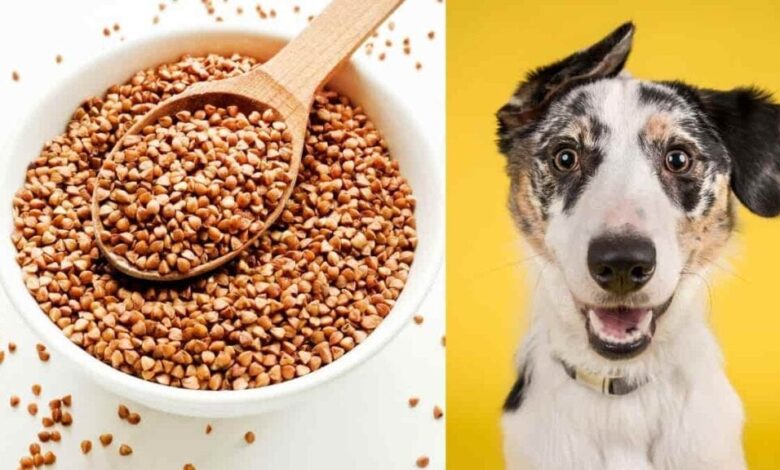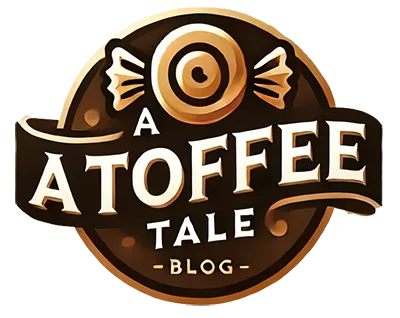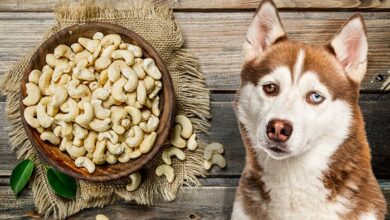Can Dog Eats Buckwheat? Navigating the World of Buckwheat for Canine Health-2024

Can Dog Eats Buckwheat? Welcome to the world of canine nutrition, where the quest for optimal health meets the delicious world of grains! As dog owners, we want nothing but the best for our furry companions, and that includes providing them with a diet that supports their overall health and well-being. But with so many options out there, it can be challenging to navigate the world of dog food and make informed decisions about what to feed our four-legged friends.
That’s where grains come into play. Grains play a crucial role in a dog’s diet, providing a valuable source of energy, fiber, and essential nutrients that support their overall health and well-being. From rice and oats to barley and quinoa, grains come in many shapes and sizes, each offering its own unique nutritional benefits.
But what about buckwheat? Can dogs eat buckwheat? While it may not be as well-known as other grains, buckwheat is gaining recognition for its impressive nutritional profile and potential benefits for canine health. Buckwheat is a highly nutritious grain-like seed that’s packed with protein, fiber, vitamins, and minerals—making it a valuable addition to any dog’s diet.

In the following sections, we’ll delve deeper into the significance of grains in a dog’s diet and explore the potential benefits of incorporating buckwheat into their meals. Get ready to discover why buckwheat is more than just a grain—it’s a nutritional powerhouse that can help support your dog’s health and vitality for years to come!
Exploring the Nutritional Value of Buckwheat
Can Dog Eats Buckwheat? Buckwheat, often overlooked but packed with nutrition, is emerging as a valuable ingredient in canine diets. Let’s explore its nutritional value and understand how it compares to other grains commonly found in dog food.
Exploring the Nutritional Value of Buckwheat:
Nutritional Composition:
- Protein Content: Buckwheat is renowned for its high protein content, making it a valuable source of essential amino acids for dogs.
- Beneficial Fiber: Rich in dietary fiber, buckwheat supports digestive health by promoting regular bowel movements and aiding in nutrient absorption.
- Essential Vitamins and Minerals: Buckwheat is packed with vitamins and minerals, including B vitamins (such as niacin, thiamine, and riboflavin), magnesium, zinc, and iron, which are vital for various physiological functions in dogs.
Comparison with Other Grains:
- Protein Content: Compared to traditional grains like wheat and corn, buckwheat typically contains higher levels of protein, making it an attractive option for dogs needing additional protein in their diet.
- Fiber Content: Buckwheat generally has higher fiber content than refined grains like white rice, providing dogs with essential dietary fiber for digestive health.
- Nutrient Density: Buckwheat offers a more diverse array of vitamins and minerals compared to some other grains, enhancing the overall nutritional value of dog food formulations.
Can Dog Eats Buckwheat? By incorporating buckwheat into your dog’s diet, you can provide them with a nutrient-rich source of energy and essential nutrients that support their overall health and well-being.
Health Benefits of Buckwheat for Dogs-Can Dog Eats Buckwheat?
Can Dog Eats Buckwheat? Buckwheat, with its nutrient-rich profile, offers numerous potential health benefits for dogs when incorporated into their diet. Let’s explore how adding buckwheat to your dog’s meals can contribute to their overall health and well-being.
Health Benefits of Buckwheat for Dogs:
Improved Digestive Health:
- High Fiber Content: Buckwheat is rich in dietary fiber, which aids in digestion by promoting regular bowel movements and preventing constipation.
- Supports Gut Microbiota: The fiber in buckwheat acts as a prebiotic, nourishing beneficial bacteria in the gut and promoting a healthy digestive system.
Heart Health:
- Lowers Cholesterol Levels: Buckwheat contains compounds like rutin, which have been shown to help lower cholesterol levels, reducing the risk of heart disease in dogs.
- Supports Cardiovascular Function: The magnesium and potassium found in buckwheat contribute to heart health by regulating blood pressure and supporting proper heart function.
Immune Function:
- Rich in Antioxidants: Buckwheat is packed with antioxidants like flavonoids and phenolic compounds, which help neutralize harmful free radicals and support immune function.
- Vitamin and Mineral Content: Buckwheat provides essential vitamins and minerals, such as vitamin B6, zinc, and iron, that play crucial roles in immune system function.
Real-Life Examples and Anecdotal Evidence:
Many dog owners have reported improvements in their pet’s digestion, including reduced bloating and firmer stools, after introducing buckwheat into their diet.Some veterinarians recommend buckwheat as part of a holistic approach to managing heart conditions and supporting cardiovascular health in dogs.Dogs fed a balanced diet containing buckwheat have shown resilience to common ailments and infections, indicating strengthened immune function.
Can Dog Eats Buckwheat? Incorporating buckwheat into your dog’s diet can provide them with a variety of health benefits, from improved digestion to enhanced heart health and immune function. As with any dietary change, it’s essential to consult with your veterinarian to ensure that buckwheat is suitable for your dog’s individual needs and health status.
Selecting and Introducing Buckwheat to Your Dog’s Diet
Can Dog Eats Buckwheat? Selecting and introducing buckwheat into your dog’s diet requires careful consideration to ensure their health and well-being. Let’s explore how to choose high-quality buckwheat products and safely introduce them to your furry friend’s meals.
Selecting High-Quality Buckwheat Products for Dogs:
Look for Organic Options:
Organic buckwheat is grown without synthetic pesticides or fertilizers, reducing the risk of exposure to harmful chemicals.Certified organic buckwheat ensures higher quality and purity, making it a safer choice for your dog’s diet.
Opt for Non-GMO:
Choose buckwheat products labeled as non-GMO (Genetically Modified Organism) to avoid potential health risks associated with genetically modified crops.Non-GMO buckwheat is produced using traditional breeding methods, ensuring its safety and nutritional integrity.
Introducing Buckwheat to Your Dog’s Diet:
Start Slowly:
Begin by introducing small amounts of cooked buckwheat into your dog’s regular meals.Monitor your dog for any signs of digestive upset, such as diarrhea or vomiting, during the initial introduction period.
Gradually Increase Quantity:
Gradually increase the amount of buckwheat in your dog’s meals over several days to allow their digestive system to adjust.Monitor your dog’s stool consistency and overall health throughout the transition process.
Observe for Allergic Reactions:
Can Dog Eats Buckwheat? Keep an eye out for any signs of allergic reactions, such as itching, skin irritation, or gastrointestinal issues, after introducing buckwheat into your dog’s diet.If your dog exhibits any adverse reactions, discontinue feeding buckwheat and consult your veterinarian for guidance.
By selecting high-quality buckwheat products and introducing them gradually into your dog’s diet, you can provide them with a nutritious and delicious addition to their meals. Always prioritize your dog’s health and well-being by choosing organic, non-GMO options and monitoring their response to new foods closely.
Incorporating Buckwheat into Homemade Dog Food and Treats
Can Dog Eats Buckwheat? Incorporating buckwheat into homemade dog food and treats is a fantastic way to provide your canine companion with nutritious and delicious meals. Let’s explore some creative recipes and meal ideas that feature buckwheat as a key ingredient, along with tips for cooking and preparing this nutrient-rich grain.
Recipes and Meal Ideas Featuring Buckwheat:
Buckwheat and Turkey Meatballs:
Combine cooked buckwheat with lean ground turkey, grated carrots, and a beaten egg.Form the mixture into meatballs and bake until cooked through.Serve as a nutritious and protein-packed meal for your dog.
Buckwheat and Pumpkin Treats:
Mix cooked buckwheat with canned pumpkin puree, cinnamon, and a drizzle of honey.Roll the mixture into small balls and place them on a baking sheet.Bake until firm, then let cool before serving as a tasty and fiber-rich treat.
Buckwheat and Chicken Stew:
Cook buckwheat in low-sodium chicken broth until tender.Add cooked chicken breast, diced sweet potatoes, and peas to the pot.Simmer until all ingredients are heated through, then serve as a hearty and nutritious stew.
Tips for Cooking and Preparing Buckwheat:
Rinse Thoroughly:Before cooking buckwheat, rinse it thoroughly under cold water to remove any debris or bitter compounds.This step helps ensure that your buckwheat is clean and free from unwanted flavors.
Cook Until Tender:Cook buckwheat in water or broth until tender but still slightly chewy.Overcooking can lead to mushy buckwheat, so be sure to keep an eye on the cooking time.
Mix and Match:
Can Dog Eats Buckwheat? Get creative with your buckwheat recipes by mixing it with other nutritious ingredients like lean meats, vegetables, and fruits.Experiment with different flavor combinations to keep your dog’s meals interesting and varied.Incorporating buckwheat into homemade dog food and treats is a wonderful way to provide your furry friend with a nutritious and tasty diet. With a little creativity and some basic cooking skills, you can create a variety of delicious meals and treats that your dog will love.
Consulting with Veterinary Professionals
Can Dog Eats Buckwheat? Before making any significant changes to your dog’s diet, including introducing new grains like buckwheat, it’s essential to consult with a veterinarian. Veterinary professionals play a crucial role in guiding you through the process of providing your dog with a balanced and nutritious diet tailored to their individual needs and health concerns.
Importance of Veterinary Consultation:
Understanding Dietary Needs:
Veterinarians possess the expertise to assess your dog’s specific dietary requirements based on factors such as age, breed, size, activity level, and any underlying health conditions.
They can provide personalized recommendations on the types and amounts of food that best meet your dog’s nutritional needs.
Assessing Health Concerns:
Veterinary professionals can evaluate your dog’s overall health and identify any existing medical issues that may impact their dietary requirements.They can offer guidance on how certain foods, including grains like buckwheat, may affect your dog’s health and well-being.
Monitoring for Allergic Reactions:
Veterinarians can help identify and manage potential food allergies or sensitivities in dogs, including reactions to new ingredients like buckwheat.They can provide advice on how to recognize signs of allergic reactions and manage them effectively.
Encouraging Veterinary Consultation:
Open Dialogue:
Encourage open communication with your veterinarian about your dog’s diet and any changes you plan to make, including introducing buckwheat.Share information about your dog’s current food preferences, any previous dietary issues, and any specific health concerns you may have.
Regular Check-Ups:
Schedule regular check-ups with your veterinarian to monitor your dog’s health and nutritional status over time.
Use these appointments as an opportunity to discuss any changes in your dog’s diet and address any questions or concerns you may have.
Collaboration:
Work collaboratively with your veterinarian to develop a well-balanced and tailored approach to your dog’s nutrition.Take advantage of their expertise and guidance to ensure that your dog receives the best possible care and nutrition.
Can Dog Eats Buckwheat? By consulting with veterinary professionals, you can ensure that your dog’s diet is designed to support their overall health and well-being. Veterinary guidance is invaluable in making informed decisions about introducing new grains like buckwheat and ensuring that your dog’s nutritional needs are met.




